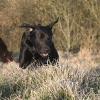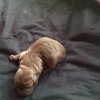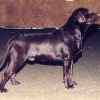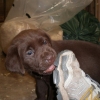Kennel Cough – Diagnoisis and Helping your dog
This is my own personal take on the absolute headache that is ‘Kennel Cough’.
Firstly dogs do not need to BE kennelled to catch it. They do not have to be in contact with kenneled dogs NOR do they need to have been in boarding kennels. Dear Old Wikapedia says it best:
Kennel cough is a highly contagious canine illness characterized by inflammation of the upper respiratory system.
The first signs of KC tends to be the dog making strange and unusual retching sounds, as if it has something stuck in its throat. Not a full blown ‘cough’, nor an actual motion to be ‘sick’, but something inbetween. Some dogs make a fairly quiet wheeze every now and then on the day leading up to them coming full blast out with unmistakable symptoms.
The most common time to make these tell tell noises is upon rising after resting. Most dogs retch and almost ‘honk’ as they cough, and many will cough up extremely noticeable white fluffy phlegm in little pools.
Dogs *may* be off colour a day or two before but most, even when full blown coughing, remain perfectly well in themselves.
The instinct is to rush down the vets. Please don’t. Call first and ask how to ‘play it’ If you walk into a waiting room full of dogs you WILL pass it around, so most vets ask you to remain in the car then just dash through.
However to be honest most healthy adult dogs do not get ‘better’ ANY quicker for having antibiotics. It has, like a severe common cold, to run its course, and the only thing really you can do is to make the dog as comfortable as possible.
I have always used cheap and cheerful Glycerin, Honey and Lemon linctus, pharmacy own brand, abut £1.80 a bottle. A big generous tablespoon in a bowl with a few shakes of glucose powder to pep them up, and warm-hot milk (be sensible on the temperature of course but the warmer the better…) Just an inch in a bowl for them to lap down can help ease things. Others use Childrens Benylin, but never say, in the Chemists that you are buying it for a DOG They will not sell it to you
A little Live Natural Yoghurt in their food for a few days can help push up the immune system a little, and basically enforce rest without going over the top. The dog needs to shift the mucus so needs to move about however because of how contagious the infection is, PLEASE PLEASE do NOT walk your dog till at least a few days after the very last day of coughing. Debate varies on the length of time, some say a couple of clear days, official canine events demand at least ten days after the last cough.
The time your dog is most contagious is when they are bringing up mucus, however the inclubation period is very approximately, seven days. So when your dog starts showing symptoms he has been contagious for at least a week previously, but of course you simply couldn’t have known so there is nothing you can do about it.
Young puppies, elderly dogs or those with weak immune systems or other unrelated illnesses should see a vet, even if they tell you the dog does not need AB’s. I have found that young puppies even when very healthy will be fine, but find it hard to shrug off a heavy dose of KC. They need a little helping hand or it drags on and on.
Some cough for a matter of a couple of days, some, like my own last dose of it, cough for 6 – 8 days and after about day 5 I would talk to a vet on the phone to see if AB’s might help.
The average healthy adult dog in good condition should shurg it off in 3 – 5 days coughing, then need keeping in a few more days after that out of good manners to other dog owners.
If you get a dose of KC inform any friends or family that have had their dogs with your dog in the previous ten days, chances are they WILL catch it. Forewarned is forearmed!
It is extremely dangerous to newborn puppies, so if you think your ‘just about to whelp bitch’ has been in contact with Kennel Cough at all PLEASE consult a vet IMMEDIATELY.
Di – Sept 2010







